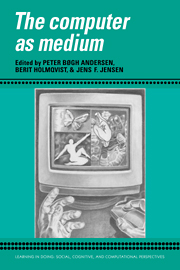Book contents
- Frontmatter
- Contents
- Series foreword
- Preface
- Contributors
- Part I Computer-based signs
- Part II The rhetoric of interactive media
- Part III Computers in context
- Introduction
- 13 Computer culture: The meaning of technology and the technology of meaning
- 14 One person, one computer: The social construction of the personal computer
- 15 Hi-tech network organizations as self-referential systems
- Comment: Disturbing communication
- 16 Dialogues in networks
- 17 Historical trends in computer and information technology
- Comment: The history of computer-based signs
- 18 A historical perspective on work practices and technology
- 19 Hypertext: From modem Utopia to post-modem dystopia?
- Index
18 - A historical perspective on work practices and technology
Published online by Cambridge University Press: 05 October 2010
- Frontmatter
- Contents
- Series foreword
- Preface
- Contributors
- Part I Computer-based signs
- Part II The rhetoric of interactive media
- Part III Computers in context
- Introduction
- 13 Computer culture: The meaning of technology and the technology of meaning
- 14 One person, one computer: The social construction of the personal computer
- 15 Hi-tech network organizations as self-referential systems
- Comment: Disturbing communication
- 16 Dialogues in networks
- 17 Historical trends in computer and information technology
- Comment: The history of computer-based signs
- 18 A historical perspective on work practices and technology
- 19 Hypertext: From modem Utopia to post-modem dystopia?
- Index
Summary
The concept of modernization does not mean the implementation of universal values in democratic institutions, but it does mean the implementation of sophisticated new technologies. (Heller, 1985:146)
Ongoing processes of change and restructuring of work are becoming a dominant reality in most organizations, often linked to the introduction of technology. While researchers in system development and design are becoming increasingly aware of the importance of the social context for the design of information technology, the subject is rarely seen in its historical perspectives. When participating in a research project on participatory design at a local district of the National Labor Inspection Service in Denmark (NLIS), we became interested in a historical perspective on the processes of change that were taking place within this institution (Bødker et al. 1991).
The work of the NLIS seems fascinating and significant to us in several ways. Not only are we ourselves analyzing work practices at the NLIS, but the institution itself is generally concerned with the interrelations of work and technology. The range of its activities is to a large degree defined by the Work Environment Laws. The laws, however, not only define the range of the NLIS's work, they also bear witness to a public understanding of work environments. In the words of Ricoeur they represent “a horizon of expectation” concerning work environment (Ricoeur, 1985: 207). In this respect the NLIS's domain is symptomatic of work and work practices in general at a social level.
- Type
- Chapter
- Information
- The Computer as Medium , pp. 457 - 476Publisher: Cambridge University PressPrint publication year: 1994
- 2
- Cited by



